#says one thing and does something COMPLETELY ANTITHETICAL
Explore tagged Tumblr posts
Text
i cant stop thinking about lug losing his cool in the sacrificial chamber in the hive. it is very funny, i will admit i laughed, and the cascade of events that follow are every fun in an og oxventure, egbert-esque sort of manner. but it’s also such a cool character moment for lug.
lug is, of course, a barbarian. and barbarians have the rage mechanic. but lug is also played by mike, and we are all familiar with how mike has fun giving his characters quirks that seem antithetical to the archetype of a character (cowboy who is afraid of horses, honorable paladin who prefers to fight with explosives rather than martial weapons). so instead of the full on, blinding rage that is associated with the class he went for the sarcastic, passive aggressive angle.
and this really works, especially when you contextualize it around who lug is and what he does. you cant fly into a reckless, white hot rage every time you hear a twig snap if your job is to guide people safely. you need to be able to pick your battles. and since we are also introduced to lug via him being pursued by an angry mob who want to kill him because they blame him for their problems (because he is not human), i think he also probably learnt from a very young age that lashing out at people who already look down on him wasn’t going to do him any favors, as satisfying as it would feel.
so instead, his rage is more subdued. his responses are measured and deliberate. in delicate situations, especially at the beginning, the group tended to turn to willowfine when they didn’t know what to say. however, there are several times where willowfine’s words fail her (whether that’s from her own self-doubt or something else), and in those moments it is lug who typically steps in and smooths things over. the most prominent of example of this is when robin finds out about morven. now, that is not to say he never puts his foot in his mouth. he absolutely beefs it more than once. he’s not perfect, either.
but that is why i love the moment in the hive. because from the moment the copestone split, team northwest was apprehensive about what happened to team north. i don’t think they were ever particularly optimistic. and now theyve infiltrated this cult and found team north. and not only are they all dead, but they died horribly and painfully and slowly. and nobody on team northwest wants to die.
so lug sees the bodies, counts the plinths, realizes the number matches their team, realizes that now with the superior in the chamber there is only one door and she is standing in front of it. as somebody whose job and background is protection, it doesn’t surprise me in the slightest that everything in his head is screaming “we’re next.”
so he panics. and he instantly blows their cover and leaves morven no choice but to kill the superior so they can maintain the element of surprise for just 30 more seconds. and it is the only time, despite the barbarian rage mechanic baked into the class, we actually see lug completely lose it. because for once he feels cornered, like the animal humans tend to view him as. and i just think that is really neat.
23 notes
·
View notes
Text
the more this girl opens her mouth the more i loathe her
#a modi/bjp supporter#stuck-up stories on ig#says one thing and does something COMPLETELY ANTITHETICAL#etc etc#bs.
3 notes
·
View notes
Text
Not certain if this has already been posted about here, but iNaturalist recently uploaded a blog post stating that they had received a grant from Google to incorporate new forms of generative AI into their 'computer vision' model.
I'm sure I don't need to tell most of you why this is a horrible idea, that does away with much of the trust gained by the thus far great service that is iNaturalist. But, to elaborate on my point, to collaborate with Google on tools such as these is a slap in the face to much of the userbase, including a multitude of biological experts and conservationists across the globe.
They claim that they will work hard to make sure that the identification information provided by the AI tools is of the highest quality, which I do not entirely doubt from this team. I would hope that there is a thorough vetting process in place for this information (Though, if you need people to vet the information, what's the point of the generative AI over a simple wiki of identification criteria). Nonetheless, if you've seen Google's (or any other tech company's) work in this field in the past, which you likely have, you will know that these tools are not ready to explain the nuances of species identification, as they continue to provide heavy amounts of complete misinformation on a daily basis. Users may be able to provide feedback, but should a casual user look to the AI for an explanation, many would not realize if what they are being told is wrong.
Furthermore, while the data is not entirely my concern, as the service has been using our data for years to train its 'computer vision' model into what it is today, and they claim to have ways to credit people in place, it does make it quite concerning that Google is involved in this deal. I can't say for certain that they will do anything more with the data given, but Google has proven time and again to be highly untrustworthy as a company.
Though, that is something I'm less concerned by than I am by the fact that a non-profit so dedicated to the biodiversity of the earth and the naturalists on it would even dare lock in a deal of this nature. Not only making a deal to create yet another shoehorned misinformation machine, that which has been proven to use more unclean energy and water (among other things) than it's worth for each unsatisfactory and untrustworthy search answer, but doing so with one of the greediest companies on the face of the earth, a beacon of smog shining in colors antithetical to the iNaturalist mission statement. It's a disgrace.
In conclusion, I want to believe in the good of iNaturalist. The point stands, though, that to do this is a step in the worst possible direction. Especially when they, for all intents and purposes, already had a system that works! With their 'computer vision' model providing basic suggestions (if not always accurate in and of itself), and user suggested IDs providing further details and corrections where needed.
If you're an iNaturalist user who stands in opposition to this decision, leave a comment on this blog post, and maybe we can get this overturned.
[Note: Yes, I am aware there is good AI used in science, this is generative AI, which is a different thing entirely. Also, if you come onto this post with strawmen or irrelevant edge-cases I will wring your neck.]
2K notes
·
View notes
Text
Himiko Yumeno is the proof of every good and beautiful thing written into V3's story. She's the combination of every endearing quality a gag character could have, with the depth and story quality of a leading cast member. Despite spending most of her time as a supporting cast member, her arc blends her seamlessly into the surviving cast, while still remaining a beautiful story on its own merits. Himiko is the annoying kid from your elementary school class that no one liked because of how insistent she was that her favorite fantasy series was real and she was actually a faerie hiding in the human realm, and refused to talk about anything else. Himiko is the kid that loved her favorite convoluted magic system more than life itself, and she grew up to love that magic so much she made a successful career out of it, succeeding in immersing herself in her passion completely. Himiko is immensely lazy outside of that magic because nothing outside of it has given her any meaning. The real world is dull and harsh and unforgiving and cruel. Real people tell her that which she holds most dear isn't real and never was, and that she's stupid for believing it, for loving it. Himiko meets someone like her, someone at a school of dull machinery and harsh cruelties, that loves something beautiful and divine that everyone else calls delusional and false. Himiko holds something in common with someone, and that feels real, too. Himiko is invited into something bigger than herself, and it feels comforting not to be alone anymore. Himiko meets someone who admires her devotion and makes every effort to show her that that devotion, that love, and reality don't have to be separate. That she can bring that same love to reality and share it the way she does in her shows. She puts it together too late. The game pulls them both away, says they were both wrong, tries to push her back down. Himiko is reminded that they were real. They both stood next to her, and they loved her, and they were real and tangible and no one can take that away so long as she doesn't let them. Himiko decides to keep them. Himiko embraces reality with magic hands and a magic heart. Himiko finds the magic of the real world, which is the people within it. Himiko is beautiful. Himiko is whole. Himiko started as everything Tsumugi wanted to be but felt nothing outside of it. Himiko became everything Tsumugi never could, and is antithetical to Tsumugi's philosophy. Himiko was right. Magic was always real. Just not in the way she thought it was.
121 notes
·
View notes
Text
soooo….my thoughts on Midoriya at the end of all things BNHA. I want to preface by saying I was never a Midoriya hater — if I dislike the protagonist of a story, I don’t keep reading. I came into things feeling fully neutral, and at the conclusion of the manga, I’m much less neutral. I think the vast majority of my dislike for him comes from his total capitulation to BNHA’s extremely callous worldview, but there’s a significant part of me that’s frustrated with myself for thinking that he was better than he was. therefore:
points the fandom takes for granted:
Midoriya is selfless
Midoriya is a good person
Midoriya wants to save others
As far as the fandom’s collective understanding of Midoriya, I think this is where we went wrong. I think it was an understandable mistake, given the definition of “hero” we were operating under (the Stain definition, if you will. I think it’s notable that Stain’s definition of a hero, which aligns more closely with the classical definition of hero, is treated as laughable by the rest of the characters. But I digress.) Under BNHA’s standards, being a hero means a variety of things — being famous, making money, fighting villains, etc. I’m not saying that Midoriya’s motivations as a five year old need to be completely pure. What I am saying is that what being a hero means to Midoriya is not what it means to us, and that’s where the trouble starts.
Initially Midoriya appears to be selfless, but what the narrative quickly reveals is that his selflessness is actually a form of reckless self-sacrifice. I don’t think it’s fair to evaluate him as a good or bad person at the beginning of the story — he’s a kid, and classifying people as “good” or “bad” is part of how BNHA got into this mess. But I think I can definitively answer the question of whether Midoriya wants to save others. And the answer is no.
But Grace, the imaginary hero fans in my head protest, Midoriya saves tons of people in the story! He saves Kota! He saves Eri! Midoriya is all about saving people. I disagree. Midoriya is all about being a hero, and saving people is something heroes do; ergo, he wants to save people. Why do I think this? Because if actually helping others, if improving people’s lives, was what mattered to Midoriya, he wouldn’t have fixated on All Might and he wouldn’t have gone to UA.
See, even though BNHA society prioritizes and elevates heroes to a ridiculous degree, they’re still able to grudgingly admit that there are problems that can’t be solved by punching people. Doctors are still necessary. Teachers are necessary. One can imagine that social workers and caregivers and nurses and EMTs are all very much necessary to keep society going. BNHA might be all about heroes, but there are still tons of ways for someone to help others that don’t involve putting on a cool outfit and flying around. At age 13/14, that’s likely evident to Midoriya, and after seven-plus years of official quirklessness with no belief that it’s possible to get a quirk + no real evidence that it’s possible to be a hero without one, he’s had enough time and distance to start looking for a way to live a life that allows him to help people.
But Midoriya doesn’t want to help people. He wants to be a hero.
Not only does he want to be a hero, he wants to be a traditional hero — not a rescue hero like Thirteen, whose actions have an immediate positive impact, or an underground hero like Eraserhead, whose work doesn’t result in newspaper headlines, but a hero like All Might, who’s world-famous, who’s rich, who’s an icon and an object of adulation. The people who need saving the most are never going to be reached by a hero like All Might, and Midoriya’s smart enough to know that. If saving people was his goal, emulating All Might would be antithetical to it. Which suggests saving people isn’t his goal at all.
This isn’t me saying Midoriya is a bad guy. In this way I think he’s a very typical kid, and ultimately, the goal of becoming a hero does imply living at least some portion of his life in service to others. What I am saying, I think, is that while we as the fandom could be forgiven for assuming that saving people was Midoriya’s dream, it was never his ultimate goal.
that’s all for now. more of this coming later, likely in the vein of dissecting his worldview.
126 notes
·
View notes
Note
Hello! I just saw your latest post and you might have been referring to my ask if it was the one about Ratiorine's differing philosophies or of what philosophies they abide by (existentialism, absurdism, etc) then that's me! If you weren't referring to that I apologize for the confusion. Sending it off anon this time so maybe it doesn't disappear 🥲
Sorry for the ask disappearing the first time; I'm not sure what happened, and I was so sad because I had been carefully holding on to it to answer it! I'm glad you were able to resend.
I do have to say first that philosophy is not my area of expertise, so there may be much more qualified philosophy buffs out there who can answer this more accurately than me, but I'll give it a go with my personal understandings of the characters:
First, Ratio is the easier of the two I think. As many people have said, he's a good fit for existentialism. His entire shtick is basically believing in the power of the individual to improve and enrich their own life, to fight valiantly regardless of the hardships imposed by their life's circumstances, and to make themself into a better person by their own choices.

It's important to underscore that this means Ratio believes in self-determination, in the idea that people's lives are not foreordained but are actually actively shaped each day by personal decisions. Therefore, people have inherent freedom to decide the course of their own lives by accepting what they approve of, refusing to accept what they disapprove of, and harnessing their own individual power to ultimately achieve self-actualization.

Essentially, Ratio works under the impression that life is not guided by something as intangible as destiny, and no matter where you start off in life, what ultimately happens to you is within your control (or at least within the control of whoever controls you). This is likely a small part of why it grates on him so badly that he wasn't recognized by Nous, because the fact that one can dedicate everything to a goal and still not achieve that goal runs contrary to his central philosophy.
If he believes that people have the power to determine the course of their own lives, then what does it say about him, who fought so hard to do exactly as he claims even idiots can do--seize control his own fate--and yet didn't succeed? Are there some things outside of man's power? It's enough to make even a renowned doctor question himself, and Ratio decided to come out on the side of "It's a personal failing, not a flaw in my philosophy." He literally said "Skill issue" to himself.

Changing tack a tiny bit here, I think it's also important to emphasize that there is a difference between existentialism and nihilism even though these philosophies dovetail. Again, I'm not an expert in philosophy, so my understanding is very limited, but the basic idea of existentialism is that "existence comes before essence"--that is, things start as a blank slate and gain nature and meaning after the fact. We are not created by some grand design, nor is there any inherent "purpose for living." Things just exist because they exist.
This is where existentialism intersects with nihilism, at the starting point that existence is inherently meaningless. But, in my personal opinion, nihilism as a philosophy fails to move beyond that. Pure nihilism is ultimately self-defeating because it leaves us with no motivation to commit to growth. It's a philosophy antithetical to the continuation of life as we know it. Existence is meaningless and any meaning you personally derive from existence is also meaningless, so why bother attempting to derive any meaning at all? This complete apathy is the Device IX that Star Rail paints as so dangerous.

And Ratio is not this way at all. His philosophy absolutely reaffirms that life can have meaning, so long as people create that meaning for themselves. He simultaneously asserts that anything that people create is not meaningless ...which basically means that meaning itself cannot be meaningless. (If that makes any sense to anyone.)
Frankly, I would argue that this philosophy may be a core part of why Ratio has not been recognized by Nous so far, rather than simply his "being a good person." (Nous is a robotic AI super-computer, why would THEY care about the presence or lack of human empathy?) Ultimately, Ratio's central philosophy about people being capable of determining their own fates and purposes also applies to his understanding of knowledge--knowledge is not something which is inherent in certain beings from birth or limited to the purview of the "special" (geniuses), but is attainable by all people. People are not "born talented" or "born untalented," they are simply "educated" or "uneducated," with the only barrier between these categories being one's own personal willingness to change. The mundane can become the divine--if they work hard enough at it.

Thus, knowledge is not wealth to be hoarded, but a currency to be spent to enrich other members of humanity.
(By the way, completely random aside--it also surprises me that everyone relates Ratio to Alhaitham from Genshin when they literally have such a glaring fundamental discrepancy in their understanding of the concept of wisdom... But anyway, back on topic!)
Ratio may (sort of) respect the members of the Genius Society, may recognize their incredible knowledge and abilities, but at the heart of the matter lies a single all-important question: Does Ratio even really believe in "genius" as a distinction (other than as a concept to insult himself)? Does he truly believe there is barrier between brilliance and idiocy that "ordinary people" can never cross?

He speaks convincingly about geniuses being different from "the ordinary," but if his core belief is that people have the power to pull themselves up out of despair and achieve greatness through effort and self-development, rather than some form of luck or god-given talent at birth, then... do born "geniuses" even really exist? Is there really an insurmountable difference between brilliant and mundane?
If knowledge is the equalizer of all sentient beings, do we not all have at least the initial capacity to become geniuses?
I personally think this central distinction about the capacity for knowledge among all humanity is the actual deciding factor in Ratio's rejection from the Genius Society, because, at the end of the day... how do you become a member of the "Genius Society" when you fundamentally reject the distinction of "genius" as an exclusive category from the start?

Ratio wants to share knowledge and uplift everyone (even if he thinks most people are starting off at the rock bottom known as idiocy).
His mission is diametrically opposed to the concept of a "Genius Society" in the first place.
He wanted in to the cool kids club because he desperately craves validation and acceptance, but the philosophical values of the Genius Society are ultimately incompatible with his own. In short, he would have to cease to be "Veritas Ratio" to succeed in joining the geniuses.
Okay, okay, back to the original point again, and just one more note about Ratio: Even though existentialism also goes hand-in-hand with absurdism, I don't think Ratio is far enough down the philosophical rabbit hole to believe in the wider definition of absurdism. Although I think he does agree with the inherent meaninglessness of existence, I don't think he views existence itself as truly irrational and the universe as as manifestation of unknowable chaos. I think he'd at least like to imagine that there are some ontological principles and inherent laws governing the operations of reality, and I think he does believe that certain things can be predicted with the application of enough thought... He certainly seems to believe in some form of "objective truth," at the very least.

I think he'd at least like to believe the universe is semi-orderly, even if he might deep down admit this is also wishful thinking.
So, to me he reads as a strong metaphor for pure existentialism, with deliberate rejections to both nihilism's apathy and absurdism's lean toward solely subjective reality.
PHEW, this is already long and I still have a whole other character to talk about... I had more to say about this topic than I thought. Sorry for the long read!
Anyway... Aventurine.

I've seen all sorts of things thrown around for Aventurine's philosophy, and while I think he does inherit a bit of Acheron's absurdism by the end of 2.1, I actually don't think Aventurine is an absurdist, an existentialist, or a nihilist.

I think Aventurine is a struggling fatalist.
He doesn't like it. We see him actively question it, but ultimately, he does come back to the concept of destiny over and over.

First, I think it's important to draw a clear distinction between Ratio and Aventurine: Ratio's existentialism is a philosophy that technically works even in a theological vacuum. Nous doesn't have to exist for Ratio's philosophy to function. Ratio's belief in the self-determination of humanity is, in fact, somewhat opposed to belief in aeons in the first place, and only works because technically the aeons of Star Rail used to be human (or were originally human creations). It's essentially an atheist viewpoint.
But Aventurine is a religious character. Like, he's just... religious. That's a fact about him. Even though we do hear his doubts, at the end of the day, he actually believes in Gaiathra, and believing in a omniscient supernatural being that is not human in origin (is from outside the aeon system) comes with a whole set of philosophical foundations that most aeon-worshipping characters just don't have in Star Rail. (Sunday is the obvious exception here, by the way.)

Kakavasha's like the one practicing pagan in the middle of an atheist convention. Awkward.
Being more serious: Religion requires faith. Faith requires the ability to believe in things you cannot verify with empirical facts. To believe in things you can only feel, never see. The belief that a goddess is watching over you, blessing you, and guiding you requires you to also accept the idea that events in your life are not always in your own control--that some of what occurs to you is decided by powers beyond your comprehension.
In essence, faith requires belief in fate. And that leads to fatalism.


No matter how much he doesn't like it, no matter how much we see him struggle with it, Aventurine does actually seem to believe in the concept of fate. He believes that some events in life are destined to occur, that some things are outside of individuals' control, and that ultimately not everything can be changed.
This is the dead opposite of Ratio's mindset: No matter how hard we fight, how far we push ourselves... in the end, sometimes people fail. Sometimes the only answer to our endless struggles is that we die, as we were destined to, before ever achieving the greatness we sought or the futures we were promised.

As an aside, I don't think faith or religion are necessarily the only factors connecting Aventurine to this particular philosophy either. Even removing theological aspects from the conversation, his extreme focus on the gambling aesthetic suggests a strong connection to fatalism too--if not a goddess, then one's fate may as well be in the hands of luck itself, of the whims of the rolling dice--or the push and pull of "powers that be," those figures of authority in the room where it happens, who make their shady deals according to preset rules and expectations, every bet resulting in an ultimately predictable outcome.
(He keeps gambling and gambling, hoping that he'll get a different result than the one he knows is inevitable...)
This is, of course, an inherently pessimistic mindset, a perfect dark-mirror to Ratio's deep-down optimism. Fatalism puts humanity into a position of powerlessness. All hopes and dreams are given over to the goddess, by whose judgment and whims the actual events of one's life are decided. Pain and poverty are inevitable trials. Suffering and death are foreordained.

And yet Aventurine has to cling to this, as much as he doubts it, as much as he hates the idea that things in his life are beyond his power to control.
Because if fate doesn't exist... If it wasn't destiny, if the tragedies of his life weren't trials from the goddess, if things weren't supposed to go this way... Then every single thing in his life really is meaningless. Everything he suffered, everyone he loved and loss, his mother's and sister's sacrifices, the torment he went through--just sheer bad luck. All of it, completely and utterly meaningless.


How can you convince yourself to keep living, in the face of such supreme and all-encompassing Nihility?
This is the central struggle of Aventurine's character, the actual mental and emotional journey we see him undertaking from 2.0 to 2.1. He is literally on the precipice, swinging between a viewpoint that he hates--his fatalistic belief in destiny--and an entirely self-defeating philosophy--nihilism--whose only possible final outcome is suicide.

This is what his talk with Acheron at the end of 2.1 is all about. This is how she saves him. In that final cutscene, we witness Aventurine reach a mental compromise, managing to finally reconcile his necessary faith in the concept of destiny with the reality that life may truly begin meaningless--but beginning meaningless does not mean staying meaningless, and believing in destiny does not bar you from making your own choices or finding your own purpose in life.
Later on in Penacony's story, we literally see Acheron use Ratio's philosophy to reject the same nihility that crept into Aventurine's:


Acheron wards off nihility's apathy through an absurdism all her own, but one which manages to enclose both Ratio's and Aventurine's otherwise incompatible mindsets: We have no way of ever knowing for certain whether the events of our lives are fated or mere nonsense. We have no way of knowing if our choices are our own or foreordained. But we don't need to know this to find meaning and value in them. Whether life is nothing more than unpredictable chaos or a predetermined pattern of cause and effect, what matters is what you make of it.

Ultimately, I think that this post has really helped me recognize just how well Aventurine and Ratio work as philosophical foils.
They really are perfect opposites.
Aventurine's fatalism is deterministic, while Ratio's existentialism is self-deterministic. Aventurine's philosophy is inherently pessimistic; Ratio's is inherently optimistic. Ratio's philosophy operates on a core belief in the freedom of humanity to decide their own paths in life, while Aventurine hates but does ultimately believe that people aren't really in control, that even if no gods are guiding us, we can't rise above our own natures. Ratio's philosophy makes meaning from growth; Aventurine's makes meaning from loss...
And they both struggle with fundamental doubts in their own philosophies, core questions that are directly tied to their own lives. Aventurine worries that his faith might be misplaced, that destiny might not exist, and that everything he suffered might have been in pointless, empty vain. Ratio faces the crisis of recognizing that his core belief in the power of humankind to determine their own paths and make their own meaning might not actually apply to everyone--because it doesn't seem to apply to himself.

It's literally only by bridging this philosophical binary with Acheron's anti-Nihility absurdist rhetoric that we can reach some sort of healthy outcome. That's why it takes both Ratio's note and Acheron's comments to finally lead Aventurine to acceptance. Ratio probably needs a little bit of Aventurine's "If you didn't make it into the Genius Society, there's got to be a reason" mindset to finally reach some peace with his situation too.
I'm not even a philosophy expert and even I can see that there's really only one takeaway here: These two characters were totally written with each other in mind.
Aventurine and Ratio need each other on core metaphysical levels! 😂

It's so good guys. You can't see it, but I'm making chef's kisses, I promise.
#honkai star rail#aventurine#dr. ratio#ratiorine#aventio#well the implication is there at least#character analysis#honkai star rail meta#philosophy#long post is long#this took so long oops I'm posting at 2am#entirely unrelated but innenofutari#you are very based for having a Princess Tutu quote in your bio#that's the most important thing I could tag this post with#actually#also if my philosophy understanding is all wrong I'm sorry#not gonna lie I dated a philosophy major in college soooo#that should tell you everything you need to know about my feelings toward philosophy
249 notes
·
View notes
Text
ASK COMPILATION: LORE, CHARACTERIZATION, AND THE ONE IN WHICH I RUIN A BUNCH OF PEOPLE'S FUN
As usual, this is far from all of the asks in my inbox but I'm trying to catch up 😩thank you everyone for your patience!
For the record, if your ask isn't being answered, that most likely means one of three things:
I am saving it as a possible art prompt.
I sincerely don't have a very interesting or good reply for it yet!
It's a question I have been asked multiple times/the answer is in my pinned post.

Glad you like them!!
As much as I don't limit what I draw to canonical events, vampirism is so antithetical to DU drow's character journey that I couldn't really envision it, to be honest, but who knows! Maybe I'll cook up some Ascended Astarion scenario someday that is kind of a role-reversal of the Bhaalist DU Drow AU I have going on in tandem to the story.

I'll be honest, this is one of the rare times where I'm really not sure which aspect of DU drow's weirdness this is in reference to. Do you know something I don't? 😅

His masochism is very... Classic, I guess? He's in it for the pain and for the emotional connection, and the process of being pierced wouldn't cut it whatsoever, it's too subtle. The body modifications he has are an incidental result of it, but they were never really the goal.
Also having stuff dangling off his face or body would just irritate him, he specifically only does rings because all other types of jewellery get in the way too much. Pre-tadpole Bhaalist drow obviously wore them by the ton, but only as a symbol of status and because he had a permanent new-money complex🤷 so yeah not a piercing-type of character at all, sorry!

He's smooth from the eyelashes-down and profoundly weirded out by body hair LOL

I don't personally think that whatever Astarion had for a home before would bear my resemblance to it after 200 years - having probably gone through several owners, remodeled, if not completely lost to the destruction of the end-game. I do HC that he used to visit it whenever he could as an enthralled spawn to read his mail, but he stopped after his father passed.

THANK YOU, I THINK? I can't say that isn't a passionate description at least!
I'm honestly surprised that this comes up as often as it does LOL but it's just an stylistic choice on my end!

The latter - for sure. He figured that them dying at each other's hands at the end was a given and took that assumption entirely for granted (and I'm sure daydreamed about it often while Gortash went on and on about political strategy during their dinner meetings.)

;))) way ahead of you and by "way ahead" I mean "eventually and whenever I can figure out when to do it alongside the other 30 ideas I am currently juggling" (but I really do want to make a little comic out of it!)

He used them! Not immediately, but he grew to trust the guardian after some initial suspicion and happily gobbled up those squirmy little things alongside Astarion. Because I made his character on a whim and without any planned backstory, I didn't really put any thought into his Guardian's appearance either, so she's just a human woman with a Joan of Arc look going on who's of no significance to him or his past.
But DU drow did trust her, again not immediately but eventually. It was honestly a big kick in the gut to him when the Emperor revealed himself and it definitely set their relationship up to fail from the get-go.
This is also why he didn't ascend to the next stage of Ilithid power, he just stomped the thing dead right on the spot LOL

LMAO I think Gortash is too proud to chase a tail he can't catch like that
He was probably very overwhelmed by the sudden realization that OH, THIS IS ALL HAPPENING BECAUSE OF ME which naturally didn't come across whatsoever to anyone present since he immediately bottled it up and tucked it away out of sight. However, as the story progressed and DU drow helped his friends get out of their respective pickles he was probably able to justify it to himself as it having been for the greater good - since it led to Astarion being freed from his master and Shadowheart to defying the Sharrans.
As for all of the rest of the ensued destruction and death that resulted from it? Well you can't make an omelette without cracking some eggs, or whatever is the wizard version of that saying. He has essentially turned the entire situation into a net-positive in his mind and sleeps great at night because of it.
142 notes
·
View notes
Text
Weyler Nation! A quick WS2 Part 2 - I forgot to talk about 2 important points about Wednesday's arc.
SPOILER ALERT: MORE QUESTIONS THAN ANSWERS!
Yeah, I know the last part is about Tyler and I am already writing. But I swear the points of today are important to Weyler. Check it out:
1- The killer cuts Wednesday's eyes out of the pic:

This is creepy af! I wonder why they do that...
The first thing which came up to my mind was about removing the eyes can symbolize the killer’s desire to control how Wednesday sees the world, or to eliminate her ability to "see" him, metaphorically or literally. Eyes are often seen as the "windows to the soul," so damaging them can represent domination over her identity or essence.
I also thought about the killer may want Wednesday to be “blind” to something perhaps their identity, actions, or plans. Symbolically removing her eyes implies a desire to keep secrets or maintain dominance through secrecy.
I mean the fact that the killer might know about Wednesday's black tears and the fact he is removing her eyes out of pics is very specific. WHAT DOES HE WANT? DOES HE KNOW ABOUT HER FAMILY SECRET?
Now pay attention:
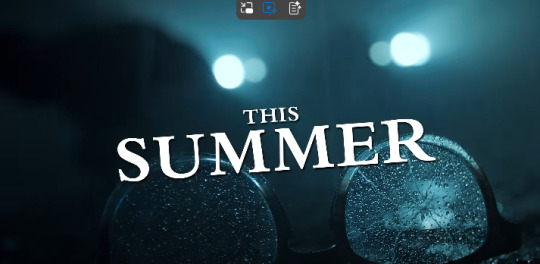

The frame with the pair of glasses and Wednesday with an eyeball on this specific position made me think with the possibility of the Killer may be removing the eyes of the victims and THIS WOULD BE INSANE!!! I wonder if the killer wants to possess Wednesday's powers somehow. or if the killer is herself as I theorized: WHY IS SHE DOING THAT? DOES SHE WANT TO GET RID OF HER POWERS?
BUT every cloud has silver lining.
2- The Fencing

It's really curious they have showed Wednesday and Morticia fencing blindfolded. It's a foreshadowing.
My theory is that there will be a point that Wednesday cant trust herself or her vision anymore. I'm guessing she will need to trust PEOPLE and that's something that challenges the core of who she is and forces her to confront both her greatest fear and her greatest flaw. To trust is to go against her very nature.
and here I'm already going to spoiler you with some Weyler content..
From Season 1, Wednesday is fiercely independent, hyper-rational, and emotionally guarded. She sees vulnerability as weakness and often mocks emotional connection.
Trusting others means surrendering control, something she hates.
To trust someone, she’d have to believe they won’t betray her, lie to her, or fail her. And that belief is antithetical to how she views the world: cold, deceptive, and dangerous. AND WITH WHOM SHE'S GOING TO TEAM UP ?
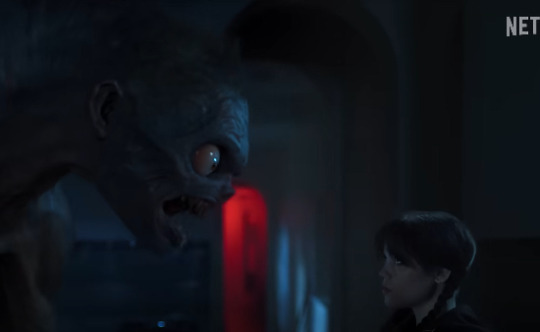
With her ex who is unpredictable, manipulative, dangerous and unreliable. Can you imagine how it sounds insane to Wednesday to trust Tyler again? But here I say: I don't think she will trust he's not going to disappoint her again(maybe she is already expecting a deceptive move by him). SHE WILL TRUST HE'S NOT GONNA KILL HER. HOW? Food for thought.
Her powers are tied to isolation and pain. Her psychic visions are triggered by touch and intense emotion.These powers are both a gift and a burden, and they’ve made her feel different, even among outcasts. She sees herself as a loner wolf because being close to others, emotionally or physically, is painful. And Tyler traumatized her! Mark my words!
Trusting others would mean accepting the pain of connection as something necessary, not avoidable.
Season 2 is clearly pushing her toward internal transformation, not just solving mysteries. The external threat mirrors the internal one: someone who tries to steal or manipulate her essence. To defeat the kiler, not just physically, but symbolically, she must become stronger in the one way She never could: by forming real human bonds.
That makes trust the climax of her arc. If she can’t open up, she stays powerful but emotionally hollow. If she does open up — she becomes whole.
and now, Weylers:
Trust Is the gateway to legacy. Morticia and Gomez trust each other completely. The Addams family thrives on loyalty.
Wednesday is heir to this emotional intelligence, but she's rejected it ... until now. The fact Hunter Doohan/Tyler had popped out in a sneak peek introducing the Addams family members still lives rent free in my head.
It's crazy how Hunter is voicing over the classic tango dancing of Morticia and Gomez and he is seated at the same scenario where Catherine and Luiz were being interviewed! Did Tyler and Wednesday's dance end for real?
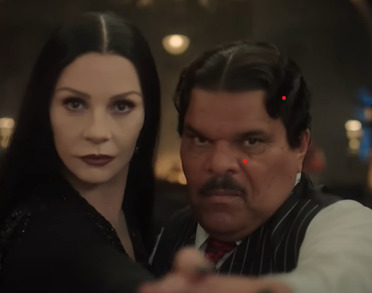
Will they dance or die? LOL

At least it means Tyler is truly connected with Wednesday and her family? HOW??? August, please!!!!!! We need you now!
HEAR ME OUT! SHE WILL NEED TO TRUST EVERYBODY INCLUDING TYLER! TYLER IS HER ULTIMATE CHALLENGE!
Her growth into her role as someone with power and insight requires her to learn what her parents already know: power without connection leads to destruction. Trust isn't just Wednesday's test: it's her transformation.
By learning to trust, she risks the one thing she's always protected: her independence. But by doing so, she may finally evolve from a brilliant, lonely observer of the world... into someone who belongs in it.
Ok, I won't promise the part 3 for today, because I'm stil writing it BUT it will come. Don't worry.
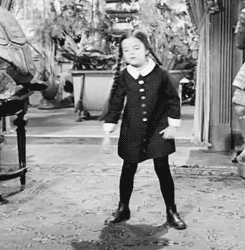
What do u guys think? Let me know your thoughts.
#weyler#wyler#tyler galpin#wednesday x tyler#tyler x wednesday#wednesday addams#wednesday netflix#wednesday season 2#tyler and wednesday#tyler wednesday
42 notes
·
View notes
Note
I apologise if this question has been asked before but- when did you get into writing and do you do it as a job? your writing is truly impeccable and I’d love to begin writing but I’m not very good lol
The true answer to this question is "as long as I can remember." I turned 25 just a few days ago, and would feel comfortable confidently saying I've been writing for 20 years. Not... Seriously of course, but some of my most early memories are of stapling paper together to make little books i wrote. I do remember, though, the actual moment in which I decided I wanted to write novels, and it was directly because my older brother had said he was going to write one. I was probably ten or eleven? Its hard to remember. I often credit him as being the reason I write, because I literally remember sitting down and starting a book that evening. He also taught me the rules for starting new paragraphs which I vehemently hated and swore I wouldnt bother doing ever but then immediately inputted into my work.
Alas, I do not get paid for writing. I am working on self publishing a novel of mine, but truthfully the publishing industry is so fucked up and so... Antithetical to things I (and I would bet on most writers) love about the craft. Did you know, that its industry standard to include 3-5 titles of published novels "similar to yours" in your cover letter to an agent to "prove you know the market/marketability of your book"? And most of the time they request you to only reference books published in the last 5 years. Basically codifying into their process that they're only ever gonna churn out copycats. Let me tell you this right now, i don't consider marketability for one goddamn second when I write. I write because it's who I am, it's like breathing for me, and I don't fucking know "similar recently published titles" because what real writer gives a shit about what anyone else is doing??? I'm writing MY stories, thank you. But evidently we're at that stage of society where publishing is just about money and if there's one thing thats true about me is that I would rather never make a dime off my writing than get sucked into a contract that forces me to churn out a YA series for mass market appeal.
Ahem. Uh. Rant over.
On that topic though I think I would greatly enjoy being an editor or working in the writing industry in other ways but I am probably never going to be a traditionally published author ✌️also I have no idea how to break into that industry and am terrible at networking so. Alas. i must fund myself other ways.
And you didn't ask for this, but you mentioned at the end of your ask that you want to begin writing but that you're not very good, and my true solemn genuine advice to that is to remind you that you have to be that way when you start. Like... Writing is something that you naturally improve over time. By reading and by physically writing, every time you do it, you get a little better. But there's no way to skip to the next level. So... You might not be great at writing. Im not gonna tell people "oh art is subjective im sure your writing is amazing" because the truth is, language is difficult and writing is a skill. And you have to practice it. But the moment you pick up a pen, you begin to improve. Before publishing any fanfiction online, I had completed five novel length stories, and the first one I ever completed sucked fucking ass. (Also I was 14 so... Sorry 14 year old me for saying your work sucks ass but it does) The fifth one was mediocre, not as embarassing. Im even proud of it. But the novel I'm trying to publish? The novel I wrote after committing a million words of fanfiction to the page over 3 years? That shit is good. Its well written. And those 3 years got me there because of constantly writing, because of the practice I put out. You HAVE to write your obligatory words of garbage before you get to write something great. Im so sorry about that. But if you love writing, and if you want to write, and if you have a story to tell, then there's no better time to start honing those skills. Every time you finish a work, the next one will start even better off. And I, personally, am so excited to see where I'll get to be in the next three years, because I'm sure it'll make my current works look mediocre.
I just don't want people to look at my work and think it's unachievable. I have those 2 decades of wanting this really badly. Of wanting to be this. But thats the only thing I have that you might not. Everything else you can learn. My skill is nothing but practice, and if you give yourself the time and space to learn the craft as well, there's absolutely nothing stopping you from being an absolutely phenomenal writer. But you do have to, you know, write.
28 notes
·
View notes
Note
State capitalism is capitalism, just not free market capitalism aka "pure" capitalism. Under capitalism, capital is privately owned (that's the literal definition of capitalism). Under state capitalism, the state privately owns the capital. Yes, the state can privately own things. Private ownership of capital just means the public has no direct effect on its operation. A privately owned company has no public stocks for example. Your mistake lies in believing capitalism necessitates a free market or ownership by an individual, when it actually doesn't.
Socialism on the other hand is when capital is completely publicly owned. For example, under socialism there is no single person in charge of any corporation. All people are considered equal shareholders.
The Nazis were state capitalists, since in Nazi Germany, things like factories were taken from the people who owned them, privatized, and became property of the state. That's state capitalism. Since actions speak louder than words, we can say they were state capitalists regardless of what they said, since in the end they did things furthered state capitalism.
As convincing as it is for you to just rehash all the claims I've already addressed with absolutely nothing new to add to the conversation other than your own misguided opinion, which you have more confidence in than I do, I must disagree.
Because you are wrong.
Your mistake is you don't know the difference between the public sector and private sector.
It's not a mistake to think capitalism necessitates a free market because it does. That's how it's defined.
Capitalism means private control of the means of production. The word private is from the latin word "privus" which literally means individual. It is inherently anti-state and anti-public ownership. Capitalism means private ownership, specifically of the individual. Otherwise it's not capitalism. State capitalism is an oxymoronic term that translates to "state non-state." Anyone who uses it, such as yourself, is just advertising that they have no idea what they are talking about.
Public ownership is defined by state ownership. That's what it means. If "state capitalism" is state ownership then it's socialism because state ownership and public ownership are the same thing. The word public is from the latin word "publicus" which means of the people or of the state.
Socialism is not all people are considered equal shareholders lol. That's the modern day socialist utopia lie. If all people are "equal shareholders" that basically means no one actually has a share. Except the state. And if everyone did equally have a share that would be dictated by....you guessed it...the state.
Socialism is state ownership of the means of production. There are different kinds of socialism but they all require the state to own the means of production. Which, remember, is public ownership which is the opposite of capitalism.
You explained yourself why it's not capitalism. If factories were taken from the people who owned them to be owned by the state that's antithetical to the very concept of capitalism. Something being "privatized" means something state owned becomes owned by a non-government party. A private party. An individual. Private ownership is the opposite of state ownership so claiming they can be done simultaneously just shows you don't know what those terms mean.
The Nazis were not state capitalists because state capitalism is an impossibility. They were socialists. Because socialism is exactly what you described in your attempts to define "state capitalism" lol.
What you really mean when you say the nazis weren't socialists is that they weren't marxists. Which is true. They weren't marxists. But they were socialists. And trying to rebrand socialism as an inherently contradictory phrase like state capitalism to try and distance socialism from the evil it led to just makes you look ignorant.
205 notes
·
View notes
Note
Don't mind me but can you plz rant about colly a lil more... :3
I'll do you one BETTER @ch1-kasak0
I'm gonna talk about Colly AND do an accidental Cuphead analysis on the side lmao
I will say, it is crazy to me that years ago, one of the reasons I had for why I didn't like the idea of Cupanny was because I perceived Fanny as someone un-ambitious, who seemed to have a bleak outlook and no real hope for a better future, something that was completely antithetical to what Cuphead needed in his life.
Obviously I don't hold that viewpoint about Fanny anymore, but I do think it's funny how that critique of mine (which I never shared on here I should add and I regret it lol) came back around but in an unexpected way. The Labyrinth arc was genuinely the deepest look we've gotten into Cuphead. With the thing that hit me the most stepping into Cuphead's dream and really seeing how much of himself is consumed by the guilt he feels about making a deal with the Devil, was how that guilt had basically consumed his personhood in a way.
Mugman dreams of being a pilot for the Calix Animi, of marrying Cala and having a whole, completed family; that his parents never left, that his dad was alive; Mugman dreamed of a future for himself. A fantasy that could never really be real, at least mostly, but it was a future nonetheless. Everyone, except Felix who's a special situation given his circumstances, dreamed of a future. Something that they were fighting towards even after they left the Labyrinth.
Except Cuphead.
He could never envision a future for himself, because so much of what made up who Cuphead was as a child was stripped from him that he's essentially a husk of who he was. We saw the real Cuphead in his dreamscape. He had aspirations, and goals he wanted to reach. But when your whole is spent struggling to survive it's hard to have real goals and aspire to them. It's hard to dream a dream that you hope comes true.
And then the gala happened.
Something that seemed out of reach for someone like himself suddenly seemed like a real, genuine reality within his reach. All because of his love for Holly. His love for her made him finally see a real future. A real dream. For one second, Cuphead didn't think about a bleak horizon that he was walking towards, but instead a beautiful sunrise that he wanted to walk towards hand-in-hand with Holly and it says a lot. It really does. In my Cuphead analysis I did say that his dream was still him in the background playing the role of Cuphead the Supporter rather than playing an active role in his own future where his own ambitions and drive exist alongside Holly's. But it doesn't detract from how much his love made him see something that for the longest he never saw as possible and that means something. It really does.
But oh, bitch I'm not even done yet. Y'all asked for this!!!
There's this one scene, I'm too lazy to go back and find it again (EDIT: I couldn't find it for some reason so my source is trust me bro), where Cuphead and Holly, and maybe Mugs was there I think, were talking and Holly said something along the lines of "I like your childish side" (paraphrasing). And that stuck with me, because when, in the other previous relationships that Cuphead had, has he ever been told that being his actual true self is the part they like the most about him? That the sulking badboy persona who's all rough edges and mysterious isn't nearly as interesting as the real him.
The thing I think a lot of people sort of forget, is that for Cuphead it's not a persona, it's just who he is. Because everything else has been stripped from him via abuse and threats to himself and his brother. From unethical experiments forced on him as punishment, to beatings from the boss when they screw up a job, to being yelled and cursed out by Hat because they messed up during training, and so on. So much of who he is, who he was, was taken from him and all that's left is whatever identity Cuphead needs to put on in that exact moment. Mugman was right when he said that for Cuphead, it's always about the damn mission. Keeping him and his brother safe, desperately trying to right his wrongs, and just trying to not have anyone see his weaknesses means the Cuphead we saw before in the Labyrinth is a ghost. Someone else entirely. A speck in the distance that feels entirely out of reach now to Cuphead.
But there's this part of him that he's tried to keep safe and held close and we see that in the Wonderful Winter arc. When Cuphead and Mugman started chasing each other, throwing snowballs at one another, it's the closest we get to seeing Cup in a light where he's not putting on a persona; the real him. And Holly notices that, too. But not just that she notices that, but that she is intrigued by it enough that she wants to get to know him more.
Holly had a crush on Cuphead, but the Tree Princess chapter is where she really fell for him. Which makes sense cause that's the chapter where she truly realizes the depth there is to his character and how multifaceted he was as a person. He wasn't just a killer thug like she'd first assumed, but a true complex person, just like her and all the other Questers.
And I think that's fucking beautiful man.
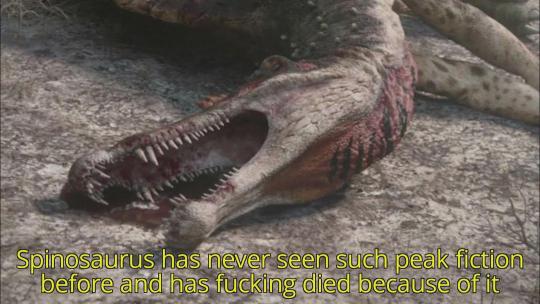
Of course I'd love to gush about Cuphead's perspective on Holly, but there's not really enough to say outside of:
You know it's true love when you're willing to spill all your secrets to this one person; to bear your whole heart and soul to them if it means being able to have them back in your life.
#the inky mystery#inky mystery#cuphead x holly#colly#inky mystery colly#inky mystery cuphead#inky mystery holly may#babitim#bendy and boris in the inky mystery#quest cuphead#yikes speaking
45 notes
·
View notes
Note
So if Rykard and Morgott hate eachother why are there two abductor virgins at the roundtable hold in Leyndell? 🤔 (i dont mean this antagonistically in anyway, im genuinely curious what your thoughts are lol)
a very good question!!! These guys are pretty unique among the placement of the other abductor virgins, because every other one is in a location with some connection to Rykard himself (which I went through in this post).
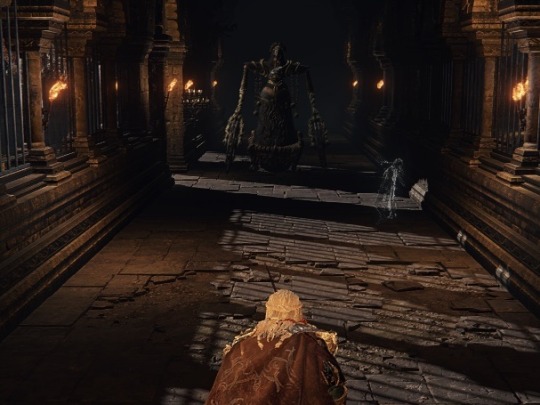
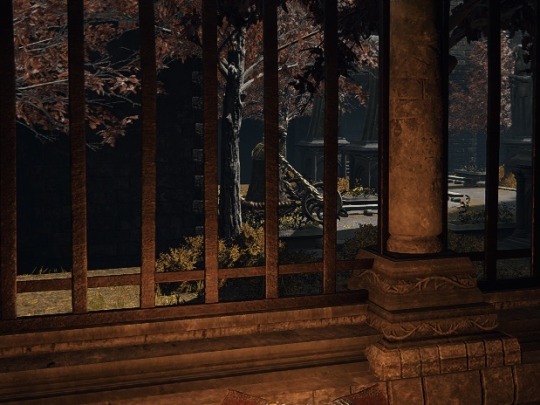
The Leyndell Roundtable Hold is called the Fortified Manor, and we can see a big lion crest on the outside wall:
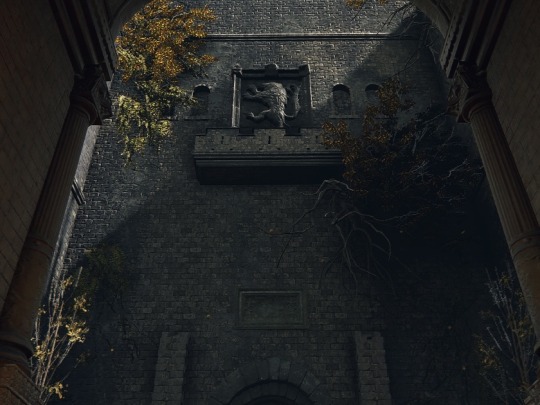
As we know, lions are associated with Godfrey, so I think it’s a safe guess that this manor once belonged to him. The other piece of information pointing to Godfrey is that the Roundtable Hold is a stronghold of Tarnished — like a safe haven for Godfrey’s warriors of old returning home.
What’s strange about the abductor virgins being here is that Rykard’s faction is notorious for employing Tarnished to kill other Tarnished, which goes against everything the Roundtable Hold stands for as a safe haven and non-combative space for Tarnished. The Roundtable Hold is also an operative of the Two Fingers, Volcano Manor’s explicit sworn enemy.
So what’s going on with these guys? Why are they found in a place not only unconnected to Rykard, but antithetical to his beliefs? If we investigate the Fortified Manor, we find it abandoned and seemingly ransacked. There is a dead body with Mad Tongue Alberich’s clothes. The abductor virgins are patrolling the inner courtyard. The Roundtable Hold that we visit is completely separate from this “real” version and seems to exist in a kind of liminal space.
We can come to the Fortified Manor to complete a quest with Bernahl for the Volcano Manor where we invade the Tarnished Vargram the Raging Wolf and Errant Sorcerer Wilhelm. I don’t think it’s a coincidence that we come to the “real” version of Roundtable Hold in order to kill Tarnished on Volcano Manor’s behalf, and Bernahl, who declares his intent to defy the Greater Will, might see attacking the Roundtable Hold as a way of attacking the Two Fingers. So we do have a connection to Rykard here in a way, and it’s an antagonistic one.
Maybe the presence of the abductor virgins has something to do with the Fortified Manor’s abandoned state? Maybe there had been some kind of invasion carried out there by the Recusants, which we continue by helping Bernahl? The only other thing of note here is that in the courtyard, there’s a lift that leads to the Divine Bridge grace, the place where that teleporter chest in Limgrave takes you. The teleporter circle is now active, and takes you to the Isolated Divine Tower, where you activate Malenia’s great rune. Does any of this have anything to do with the abductor virgins? I can’t think of any reason why it would. perplexing
Anyway, we can’t be 100% sure of why the abductors are here, but if I had to guess, I’d say they have something to do with the Recusant activity there. I guarantee you that it isn’t because Rykard, a guy known for decorating his house with paintings of burning Erdtrees, and Morgott, the Erdtree’s #1 defender, were working together. lol
#asks#elden ring#elden ring lore#rykard#absolutely bone-chilling screenshots. shout out to my sister for risking her life to take these pics while ive been away
70 notes
·
View notes
Text
Sooo, I just read a post saying that gaylors are disgusting because they want to force Taylor out of the closet?? And that NYT should not have posted that article???
Let me get something clear, if you are closeted, you try and hide your queernes as much as you can. You dont go around singing about your agumentative, antithetical dream girl and wearing someone like a necklace. You dont talk about hairpin drops. You dont dress yourself in the bi pride flag colors and sing about wanting boys and girls. Is not something you do if you are closeted.
Forcing someone out of the closet is disgunting, thats for sure, the thing were this person is wrong is that we are not trying to force Taylor out of the closet. Forcing her would be something she does not agree on but since she has been putting all the queercoding and queer slang in her music (out there to listen and analize by everyone) and decide to do some things queer people use to identify each other and send signals in public, aware she is being watched by the whole world, I would argue that the talking about her probably being queer is consented by her.
Also, saying she is in a closet would mean she is secretive about it and trying to pass as straight, which I think I gave you enough examples as to why she is not secretive about it. Is out there to see. And because is out there to see, it is okay to talk about it. She put it out there. The NYT only talked about queercoding in her music, which is completely fine to talk to. She wrote that music and she released it. She filmed that videos. Chose that words. She is in control and she decided to leave hairpin drops as often as she could. The NYT was not outing her or anything, it was just doing a reading of a piece of art using certain simbology, that happens to be the queer one. And if we think about how the art and the artist are connected, is fair enough to wonder if she could be attracted to woman. She hints at it in her music!
#gaylor#taylor swift#queer#gaylor swift#eras tour#swiftgron#the eras tour#again a lottle bit of a rant#i feel like im repeating myself in all my post#but whatever#i will say it as many times as i have to
121 notes
·
View notes
Text
like as far as the finale streams go, there's quite a bit that we can say preeeetty definitively were lies. c!dream literally goes into this whole thing like "this is the part where we monologue at you" to c!tommy, which is taking the credibility of literally everything he's saying and cutting it at LEAST by 80%

(me too tubbo)
the saw trap, rather definitively, was 100% bullshit top to bottom. i mean, come on now. dream literally gives him steak that they could've used to depress the pressure plate, and he's completely unsurprised about the two of them surviving. plus he literally added a bonus "WE'RE DOING THIS BECAUSE WE'RE EVIL" thing. like, laughably fake.

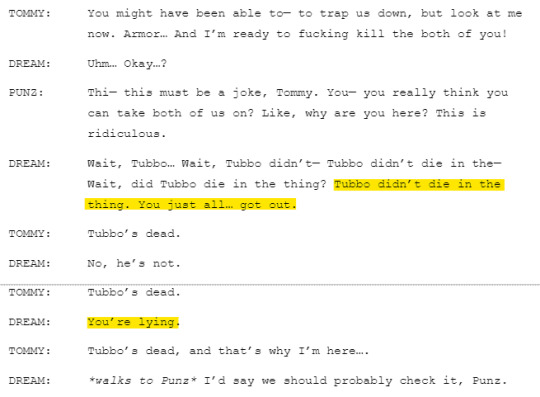
along those same lines, i mean, the "we killed vikk and lazar in every possible way for months" doesn't seem credible in the slightest. first of all, what months? unless they were doing so post-prison (and they continued to do so...after they supposedly found out about revivals causing instability???) -- and the whole point of bringing that up in the first place was pretty much just to set up for the saw trap. any and all death experimentation seems kinda limited by the fact that XD was apparently getting pissed over it
speaking of which, have we considered how funny it is that like there's a good chance that fewer problems were caused by the revival experiments compared to like. foolish dying from fall damage while building. bc foolish SURE DID DIE A LOT
i also want to bring up the "bring an army here to fight against us" moment just because it's ... so overt. i don't think it's a lie, but was dream like more than heavy-handed in hinting at what he wanted tommy and tubbo to do? holy shit yea
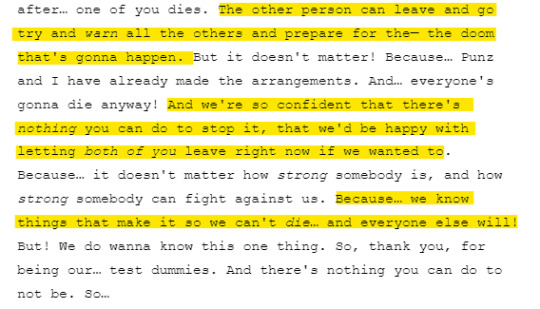
like, it's giving "talking about putting c!tommy in the prison" levels of overt.
the rest of it gets...a little murkier though, and in part because c!dream seems to at least, to some degree, contradict himself? i mean, what he says about death being permanent is SUCH a glaring example of this
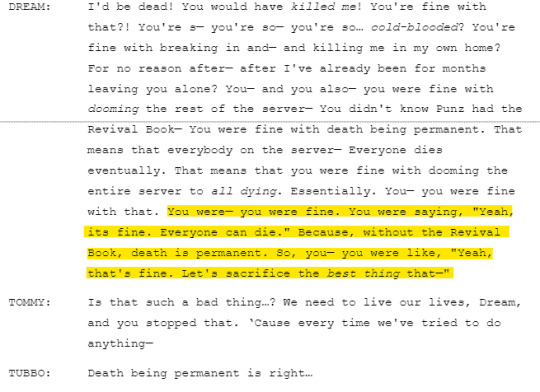

like, he's clearly got some strong opinions on the permanence of death and revivals that he brings up. a lot. but at the same time, death being impermanent is also a problem...
...and specifically, a problem in the eyes of the god here. which is accurate--we've seen XD specifically make a whole Thing about how he needs souls, how he needs death. (though it does look like he's also kinda...beholden? to something? when he mentions that too, which is interesting.)
and look, here, too, when talking about death:
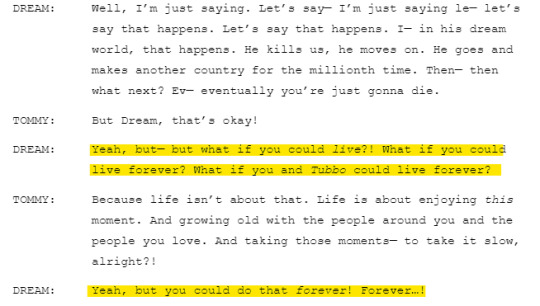
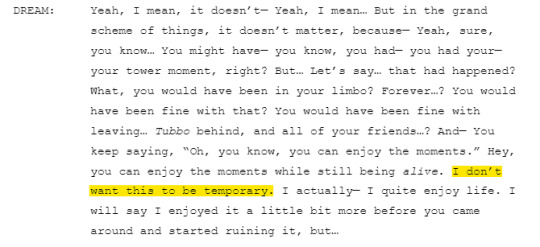
like i think it's pretty undeniable that c!dream...doesn't. actually want people to die. he's got an issue with this whole death thing. like--look at what he says, even, about the fact that they have to kill everyone? he literally calls it a problem. hell, when he could, by all means, technically get "closer" to his goals by killing c!clingy, he doesn't take it. he even revives tommy after killing him.
he's very explicit about not wanting death in the final stream, as we see here:




i've seen a few interpretations about what dream wanted being to, essentially, become immortal with punz after killing everyone. and i always didn't really agree, though i couldn't pinpoint specifics either--for one, the specific point of "only you two will be left" is something that tubbo points out first, not either dream nor punz. further, when dream mentions who would be left after "killing everyone," he actually specifically doesn't say that it's about the dream and punz show and the dream and punz show only--it's a choice of "join us in our research or die."
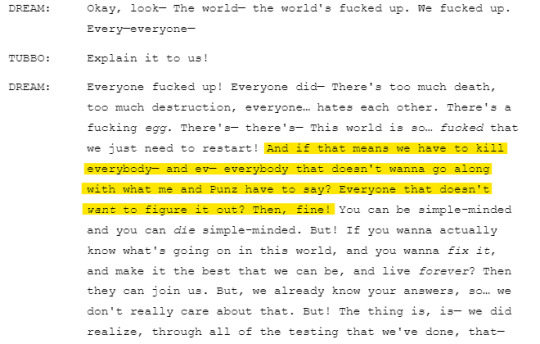
further...well, it's rather antithetical to what have been c!dream's stated motivations the entire time, right? dream doesn't want peace on the server in terms of just having like one (1) other person around that agrees with him or whatever. and again, there have been some mentioned contradictions just from these two streams alone. but looking at the contents of these last two streams again, and especially looking at the focus c!dream has on "everyone living forever and being friends and being invincible and the server being completely vanilla again" plus the return of mr. "end justifies the means", i can 100% see some kind of plan where--facing an immediate world reset--c!punz and c!dream decide to go for plan "kill people to appease the god while gathering anyone that's willing to do research with us to Figure Out How To Fix Things." the emphasis that c!dream presents on death not mattering, calling the revive book the "greatest thing" that's happened to the server, even, going "yeah it might hurt, but we can go back" seem to suggest that everyone that was babyjailed in limbo in the meantime would then be able to be revived after they idfk kill god or whatever.
like. i don't think they actually have Too Much of a plan, though we don't know that much bc we don't know how much their research went into. hell, we don't even know how much XD is actually involved in all of this! the events that trigger everything that happens looks to be almost completely out of punz and dream's control--they didn't seem to expect or even know about the nuke, they weren't involved in the egg hatching, and they weren't with eret and foolish fighting XD. all they did was...well punz revives dream and dream kills and revives tommy. (which, ironically, also what they literally said they shouldn't have done because it's what caused the instability????) -- as i pointed out in the last post, i'd say a degree of like "this is inevitable nothing matters" definitely affects c!dream in these streams, with the end of the world kind of happening around him. but as for whatever goal he DID seem to be working towards, the idea of doing research + wanting knowledge + murder for like, an actual purpose that aligns with earlier stated goals (preserving the server and making it so that people can live in peace without being haunted by death and pain and destruction) feels like it reads relatively well with what we know about 1) XD having to do with the reset, and the server being a cycle that involves worlds coming into existence and ending over and and over and over again and 2) what c!dream says in these streams, specifically referring to his stated end goal of living forever with everyone and not simply striving for immortality in its own right
55 notes
·
View notes
Text
we've all heard of Kim as an android but what if HARRY was the android?
What if the four months before Martinaise was him defecting/deviating and coming to realize that he wants more than to be the robot cop that he was made to be and him dressing in Disco clothes is his first attempt in expressing an interest in something, especially because it's completely antithetical to what everyone else at the Precinct likes? What if his lashing out and increasingly aggressive behavior is him battling with his code while also trying to suppress that anything has changed at all?
And then the fateful day comes when they arrive to solve The Hanged Man case and Harry pushes everyone away because they're talking about sending him in to get a reboot because they've noticed that he's different and he's like. I'm not going to be replaced by another version of me, I'll die as I am currently before I let that happen. But just like in the canon of the game he doesn't successfully go through with it and he wakes up with a damaged memory chip and having to relearn everything.
When he meets Kim downstairs on that first day Harry is told that Kim was expecting other officers and one support android and Harry is like. well. I'm all you have, I guess, I don't know what you're talking about. What's an android?
There's two directions to go here: Harry wakes up and forgets EVERYTHING, including that he is an android, and so he ends up doing and saying weird things in front of Kim because he just thinks that everyone more or less operates how he does. He doesn't eat because he doesn't need to and he licks more things than just the rum countertops so he can run an analyze of it (though nothing ever comes up useful as he is in desperate need for repairs so he ends up just seeming like he licks things for his own enjoyment). Kim would eventually figure out that he's an android with this route but he would never bring it up, either because he has a secret soft spot for androids in general or he sincerely just likes Harry that much that he doesn't want to remind him of his inhumanity.
OR: Harry forgets everything he's ever processed but still knows that he is an android, a busted one at that, and he has to keep it a secret so he doesn't get decommissioned. But he doesn't have access to any memory banks or any servers with information like other cop androids do, probably because he would alert someone watching out for his specific model to come back online, so he's really flying blind out there. There's an extra layer of tragedy since this means he's outright lying to Kim the entire game and at first he thinks he needs to since Kim, dedicated to following the rules of the RCM and being professional, would be honor-bound to report Harry as a defective android that is operating without his human partner and is besmirching the RCM. Except as they get closer Harry starts to feel more and more guilty about lying to Kim and then the tribunal comes and Harry is injured and he's bleeding inhuman blood and Kim is still trying to save him and Harry is like
"you don't have to work so hard to keep me alive, they will just replace me."
and before Kim can really process that Harry saves him and then passes out and Kim still stays awake with his concussion keeping Harry alive, but instead of an infection the challenge is getting Harry's components fixed when he doesn't have access to ANY android parts and he can't get any without alerting SOMEONE so he's trying to make do with like. GASP what if he uses pieces of the Kineema to fix Harry? Nothing major that would make it undriveable (idk enough about cars to justify this honestly) but it would be this huge emotional thing.
And then Harry comes back online and hes's like. Oh my god I'm still? Me? I haven't been wiped clean? and Kim is like "of course you're still you. It was only a gunshot wound, after all." and that's the last that they mention it.
(they can't keep it up forever since Kim cannot directly contradict anyone from the 41st when they know that Harry is an android, but he can defend him against accusations of being defective by citing all the moments where he showed that he's within perfect working order. It's the closest he can get to preventing Harry from being sent for a reboot).
#disco elysium#this is not a DBH based AU necessarily but it can be if you want#this is really just androids
12 notes
·
View notes
Note
How would a female Jishi be? Is it a cursed concept?
This is an interesting question, because I think, in order to have a female Jinshi with the same general characterization choices, the entire premise of The Apothecary Diaries would have to change.
Jinshi's major point of characterization is that he's in a position of power and political significance that he has to take part in, but that he doesn't actually want at all. The line of rule/inheritance is through the sons, and women are afforded very few actual career opportunities outside of being a courtesan. Maomao is an exception, not the norm--very few girls and women are allowed to be on retainer as doctors or detectives. They can be servants/court ladies, they can be ladies-in-waiting, they can be courtesans or, if they gain enough standing and attract the attention of the right people, concubines, but they aren't often allowed to be anything else. Not in the miliary, not in serious medicine, and certainly not in politics.
If Jinshi is suddenly female, then...well the only way for this character to be in a position of political power in this universe is to have gotten astronomically lucky in the process of actively working for it. The world of The Apothecary Diaries isn't going to plop a random woman into a political position for grins, and the only justification anyone would find to install a female official is...if someone had an exceptional amount of skill that was recognized by the right people, like in Maomao's case (and Maomao isn't even an official, nor does she want to be one). But how WOULD this version of Jinshi have gotten that skill, if Jinshi hadn't worked to develop it? Jinshi-as-a-girl would not have been afforded the level of education needed for that to happen, and if female-Jinshi had pursued that education on her own time...then that would suggest that she wanted to be in politics, something completely antithetical to the version of Jinshi that we know. (And even if we suspend disbelief past the point of reason and say that she magically ended up with this training she doesn't want, the only way that skill would ever come to light is if she were consistently using it in front of people, which...I don't think she would do if she wanted to avoid politics that much.)
If Jinshi doesn't have this disinterest, we have a completely different character. Which is completely fine, there's nothing wrong with that at all, plenty of character traits and archetypes can be interesting or entertaining. But I don't think a version of Jinshi that remotely resembles the canon version of this character is possible if Jinshi is now a young woman.
I think having a politically-savvy female character to contrast with Maomao would be very interesting (and given a few things I've heard, I'm hoping we might see some of that in season 2), in the sense that any power a woman has in this setting has to be carefully managed and, often, fought tirelessly and intensely for. Except for Maomao, who is...pretty much just living her life. Don't get me wrong, she does still have to be careful, and there is still a significant amount of danger she faces, but there's a surprising amount of leeway she's given, courtesy of her unique position and the fact that she has Jinshi (and. sort of? Lakan? maybe?) in her corner. And she gains a degree of relative peace in spite of her circumstances, without having to become a courtesan or concubine or politician. So for a young woman who is in a political or politically-adjacent situation to look at Maomao and go, "Well why do YOU get this degree of freedom but not ME, why do YOU get to be yourself, but I have to curate every aspect of my being?" would provide a complex and highly gripping dynamic. But I don't think a female version of Jinshi can provide that dynamic.
The only potential way female-Jinshi ends up anywhere close to the character we have in canon is if the entire gender landscape of this story is flipped--if women were the ones with social and political power, and men were the ones who had comparatively few choices afforded to them. (And this, of course, means that pretty much all of the characters have to be genderbent, which I do always find to be a really fascinating thought exercise.) But while a Reverse-Gender-Landscape version of this story isn't...a horrible idea, necessarily, I think there are very few writers out there with a deep and nuanced enough understanding of misogyny and gender politics to pull off a "What If Matriarchy Instead" story without having it fall completely flat.
But if the question becomes, "Would a female character with Jinshi's qualities still be compelling, or would she just be annoying," then. Well my answer is the same as it always is: any type of character with any combination of qualities can be compelling in the hands of a skilled enough writer.
#mel on anime lockdown#actually. maybe I DO put this in the show and character tags#(because I want. people to talk to me. about this show...........)#the apothecary diaries#jinshi#multi t(ASK)ing#I hope everyone knows that when season 2 of this comes out I will be COMPLETELY insufferable
9 notes
·
View notes